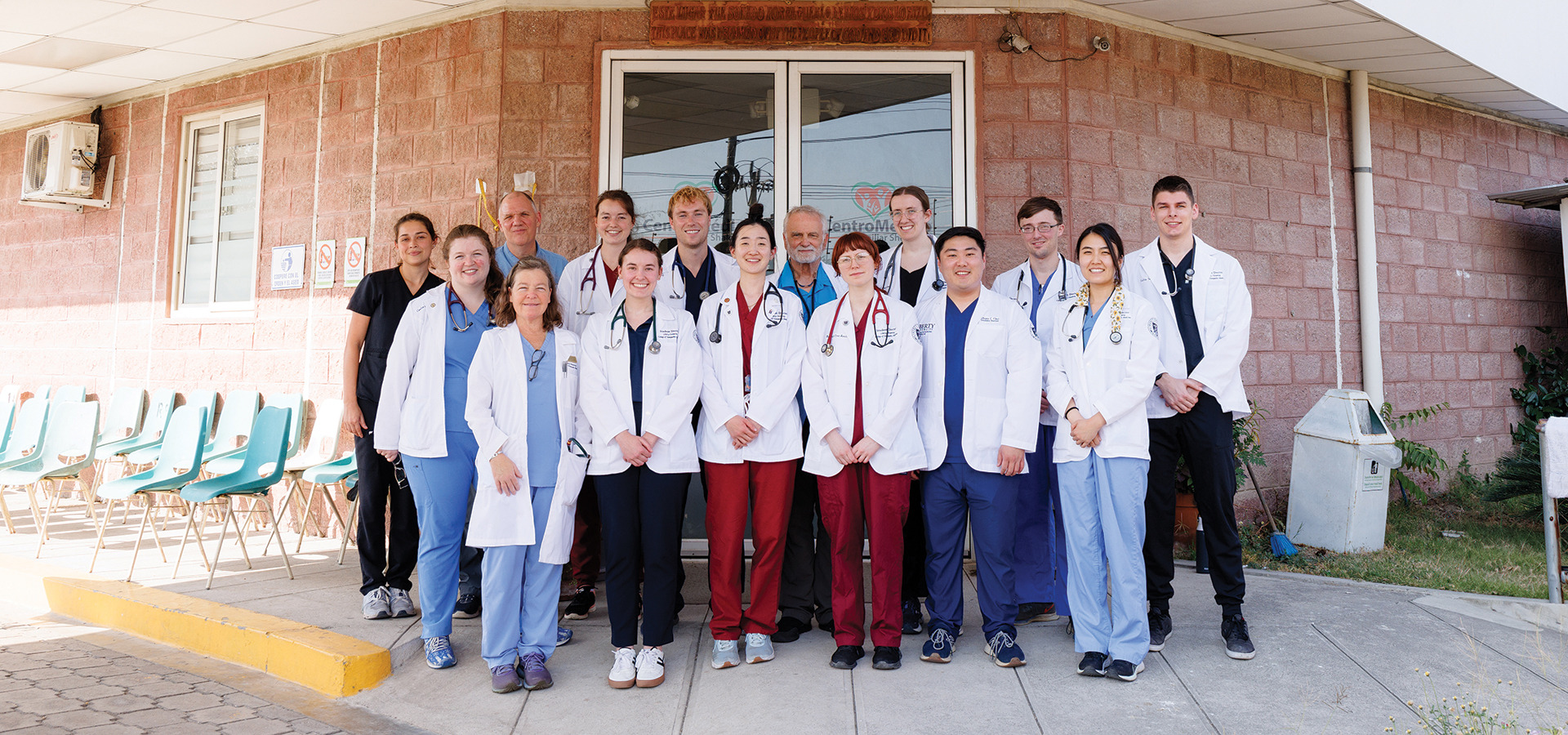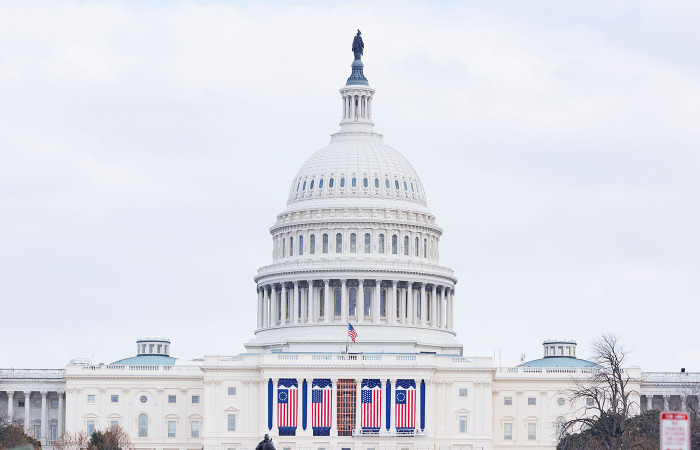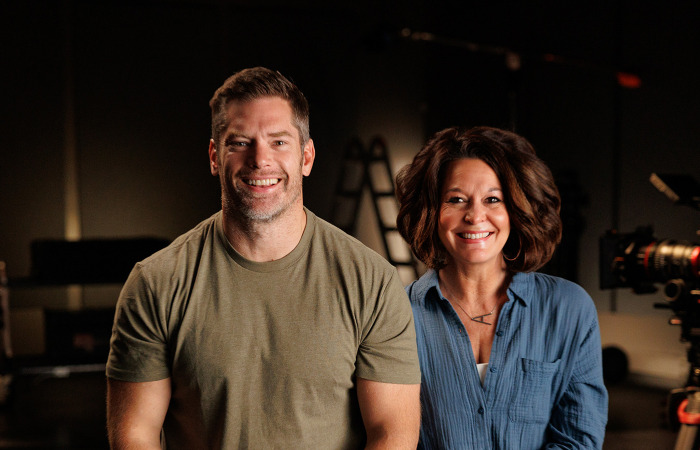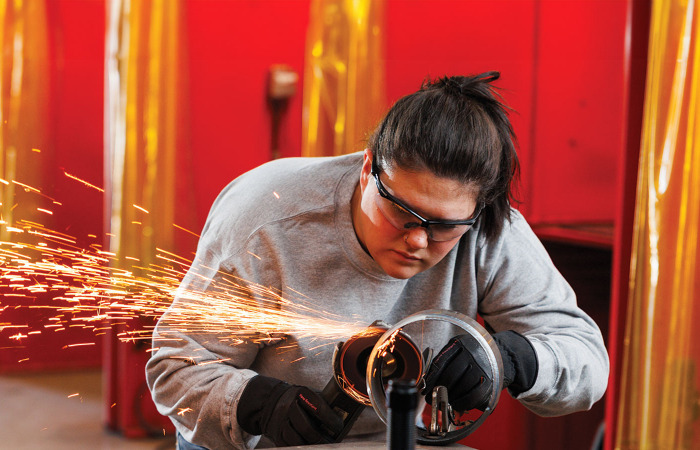LUCOM student-doctors tend to communities near and far
Student-doctors from Liberty University College of Osteopathic Medicine are choosing to be healers and helpers in their careers through medicine. In the midst of their arduous coursework, they are grasping opportunities outside the classroom to serve others both medically and missionally throughout the year, all for the glory of the Lord.
Whether they are volunteering in the small southeastern African country of Eswatini, in Central America, or just a short drive from Liberty’s campus, the medical students are using their growing knowledge and hearts for service to provide physical and spiritual care. Through the vessel of medicine, they are sharing the Gospel and being lights for Christ.
El Salvador, Central America
During LUCOM’s Spring Break, March 24-29, a team of 11 student-doctors and three faculty traveled to El Salvador to care for patients at five different sites throughout the week. The area health clinics were held in collaboration with Harvesting in Spanish and its ministry for orphaned or abandoned children, the Shalom Children’s Home. The team used the organization’s four-story clinic in the town of Santiago Texacuangos as its main location for the clinics. On two days, they used a mobile bus clinic to visit two villages — Cuyultitan and Santo Tomás — and a Youth with a Mission compound in the region.
During the clinics, student-doctors gathered the patient’s medical history, completed a physical examination pertinent to the symptoms, and then presented it to a LUCOM professor who continued assessing the patient and provided treatment. Current OMS-III (third-year student) Moses Choi said the experience was essentially his introduction to interacting with a patient in his second year at LUCOM, as LUCOM students spend their first two years in the program doing pre-clinical simulations in addition to lectures and course reading.
“As much as LUCOM does a fantastic job at simulating those different patient encounters through our standardized patient examinations, we know in the back of our heads that it is a simulation. But this was truly interactive, like we were part of the medical team, and that was really cool to experience,” Choi said. “It was refreshing to talk with people with medical issues and be a part of clinical medicine.”
“We did this trip because it gives the students hands-on experience in a supervised environment,” said Dr. Russell Melton, assistant professor of family medicine at LUCOM and the trip leader. “There’s interaction between students, there’s certainly a cultural experience, and it’s a missions opportunity. We have students who are interested in missions, and we want to give them the opportunity to explore that and let God use that in their lives and futures. The bedrock of the trip was being a light as Christians, spreading the Gospel and working with Christian organizations to help build the Kingdom around the world.”
The March trip was the third time Melton has led a trip to El Salvador to work with Harvesting in Spanish, including last spring and fall.
Thanks to Spanish translators, the team was able to communicate fully with the patients, which was crucial to providing the care they needed. Effective communication is at the core of medical care, and students said they valued the opportunity to embody and share God’s love with the patients. OMS-II Logan Murphy said a verse he found purpose in during the trip was 1 John 4:16, “We know and rely on the love God has for us. God is love. Whoever lives in love lives in God and God in them.”
“One of my biggest takeaways was seeing God’s work in a totally (different) part of the world,” Murphy said. “I feel very privileged and honored to have the opportunity to pursue medicine and that God gave me this opportunity. Down there, people are not opposed to you praying for them. We’d see patients, and a lot of times we’d pray for them at the end of seeing them. It was a beautiful experience to be a part of. I’m a Christian first and a student-doctor second.”
Eswatini and Kenya, Africa
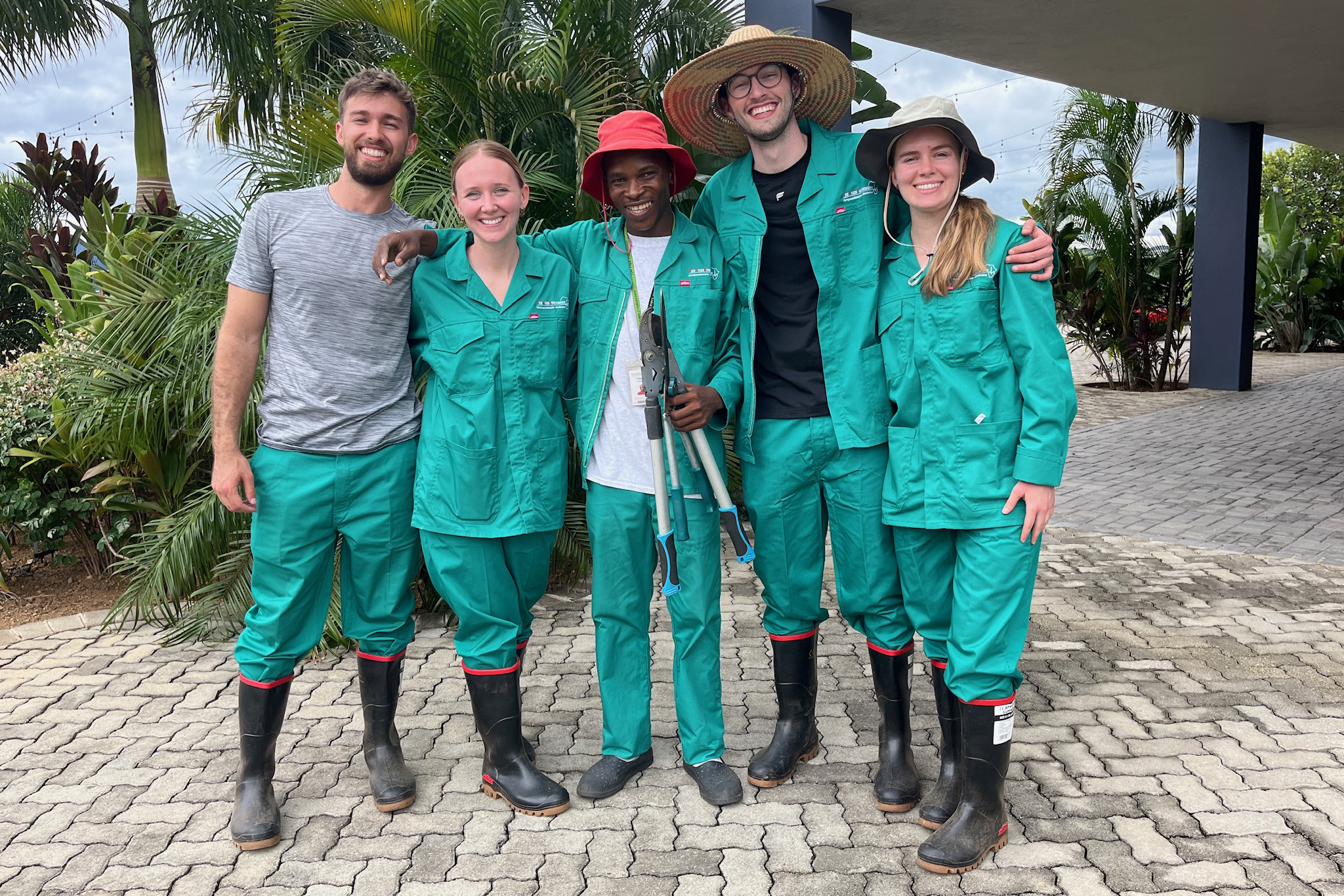
In February, four students assisted a healthcare organization in Eswatini, and a second group of 12 students served for two weeks in June.
Select fourth-year students had the opportunity to conduct one-month rotations in Africa this past spring (one week was LUCOM’s Spring Break). Four students assisted a healthcare organization in Eswatini in February, and eight served at a hospital in Kenya.
In Eswatini, the students volunteered with the Luke Commission, a group dedicated to compassionate healthcare for the underserved, to offer optometry, women’s healthcare, orthopedics, and general surgery. Eswatini has the highest prevalence of HIV and AIDS in the world — about 27.9 percent.
Student-doctor Colin Mackey, who has since entered an internal medicine residency at the Carolinas Medical Center, said the trip was an opportunity to see what medical missions would look like for himself, and he was inspired by the heartfelt care of the professionals in Eswatini.
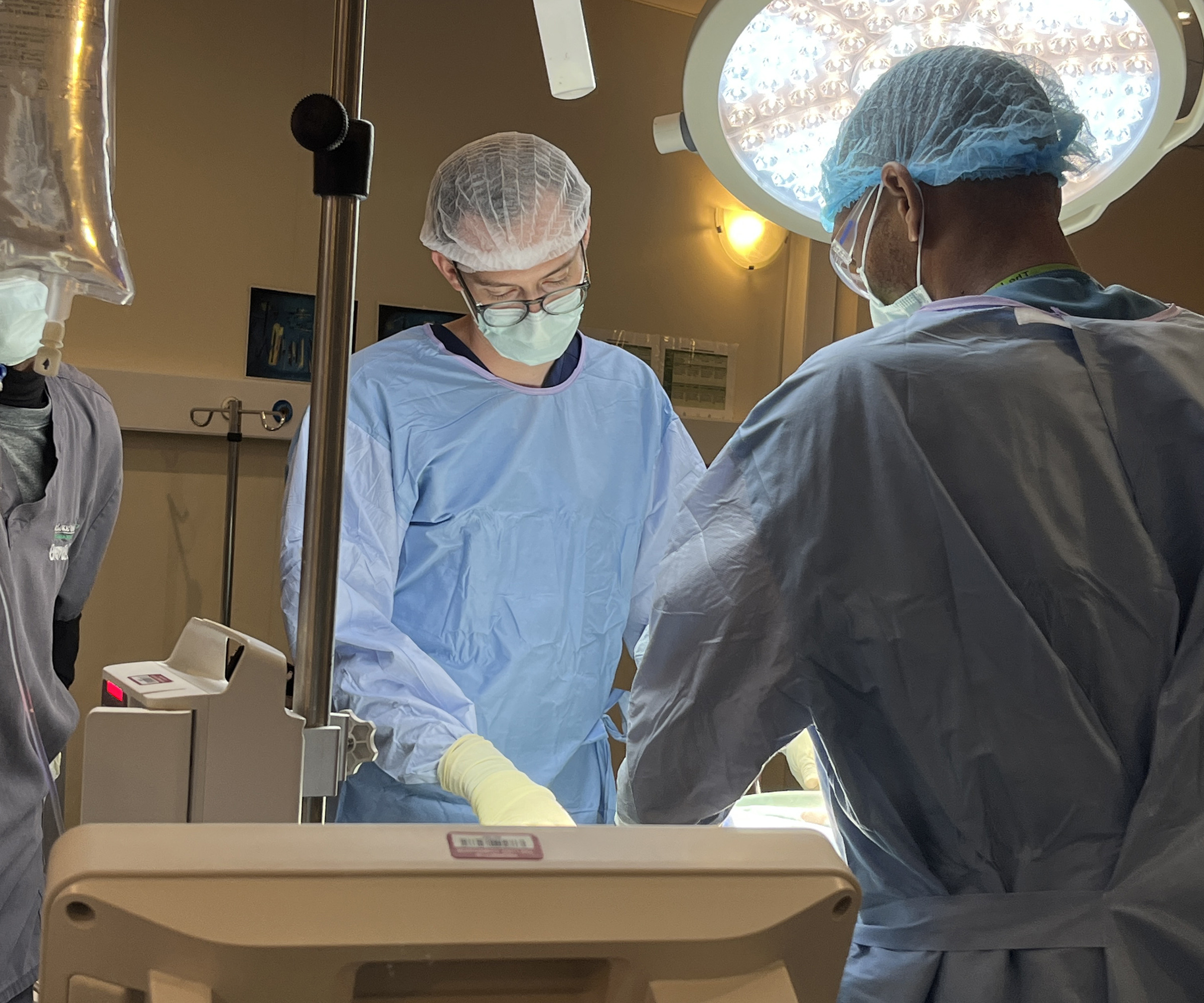
In Eswatini, the students served across many areas of medicine.
“I think the most impactful part of my trip was seeing the passion of the people who worked there,” he said. “They’re serving in a very resource-limited area; they’re serving for free and doing so joyfully and with dedication. Hopefully, I can embody that same spirit and joy in my service in the future.”
For two weeks in June, a second group — 12 students and three faculty members — visited the Luke Commission to provide specialized training in pediatric advanced life support (PALS) for the physicians and employees. Melton said LUCOM hopes to send fourth-year students to Eswatini for one-month rotations next spring and summer.
With double the number of students who have accompanied her on previous trips, Professor of Family Medicine Dr. Lauri Ann Maitland traveled to Africa with eight students in March to spend four weeks working on multiple floors of Tenwek Hospital in Bomet, Kenya. The student-doctors assisted in the medical disciplines for which they would enter their residencies just a couple months later, including obstetrics, pediatrics, inpatient medicine, emergency medicine, and pediatric surgery.
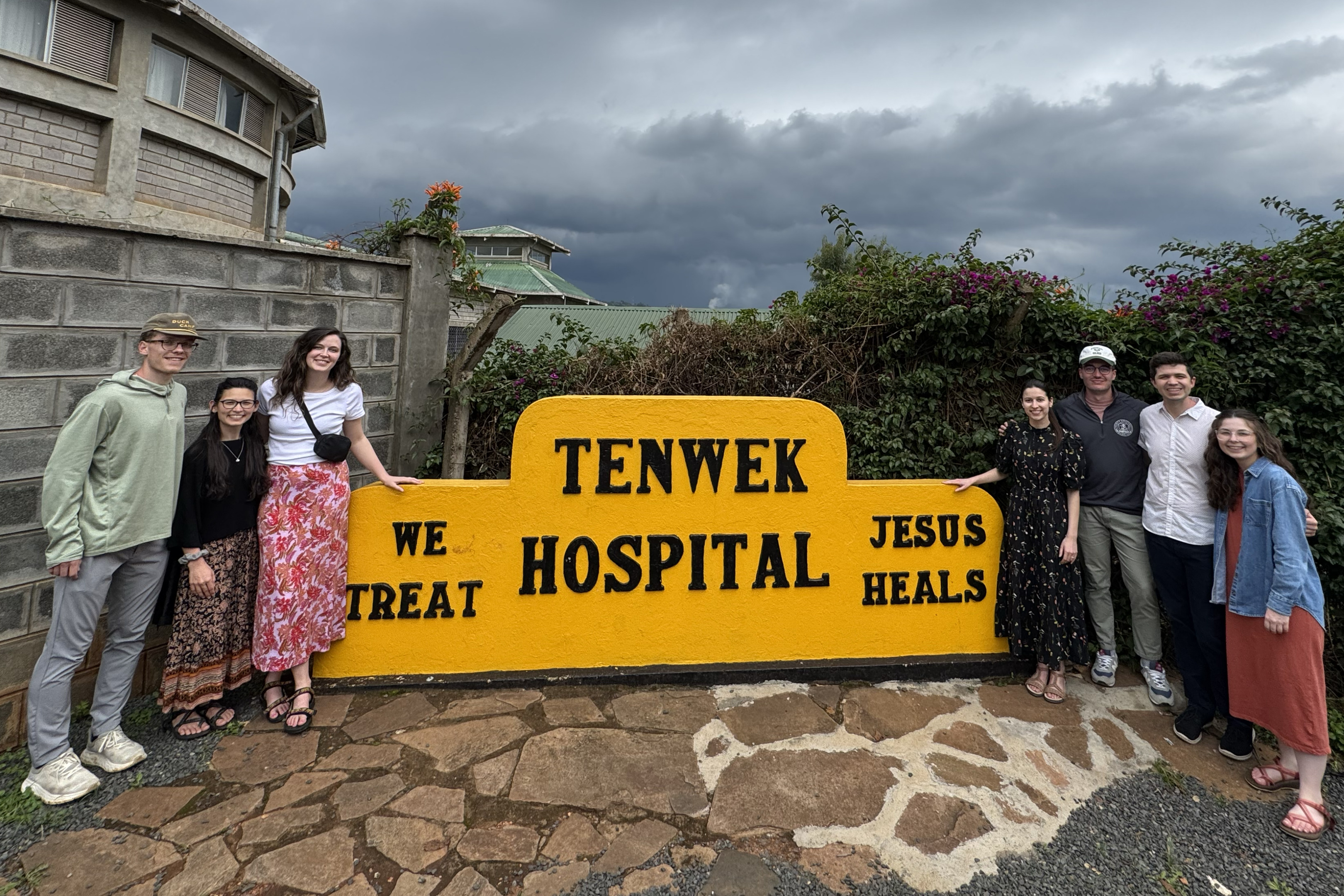
Eight students spent four weeks working on multiple floors of Tenwek Hospital in Bomet, Kenya.
This was Maitland’s fifth time leading a trip to Kenya. She has led students on three trips to Honduras and Guatemala in past years. The trip was funded by Samaritan’s Purse and World Medical Mission, covering the costs of all the students. Tenwek is a Christian hospital, and the LUCOM team was able to pray for every patient they saw.
“All patients get prayed over at Tenwek,” she said. “It is evident that the Lord’s hand is at work there through us and the local professionals. It’s a place where like-minded individuals come to spend time practicing medicine and hopefully be the hands and feet of Jesus.” She said that means not only literally using their hands to help somebody “but more the posture and attitude of servanthood. I think the students see that in
this experience.”
Recent graduate Megan Pizzo, who began her residency in emergency medicine at East Carolina University in June, said medical missions has been on her heart ever since she was a child, recognizing how a career in medicine can open doors and conversation to share the Gospel.
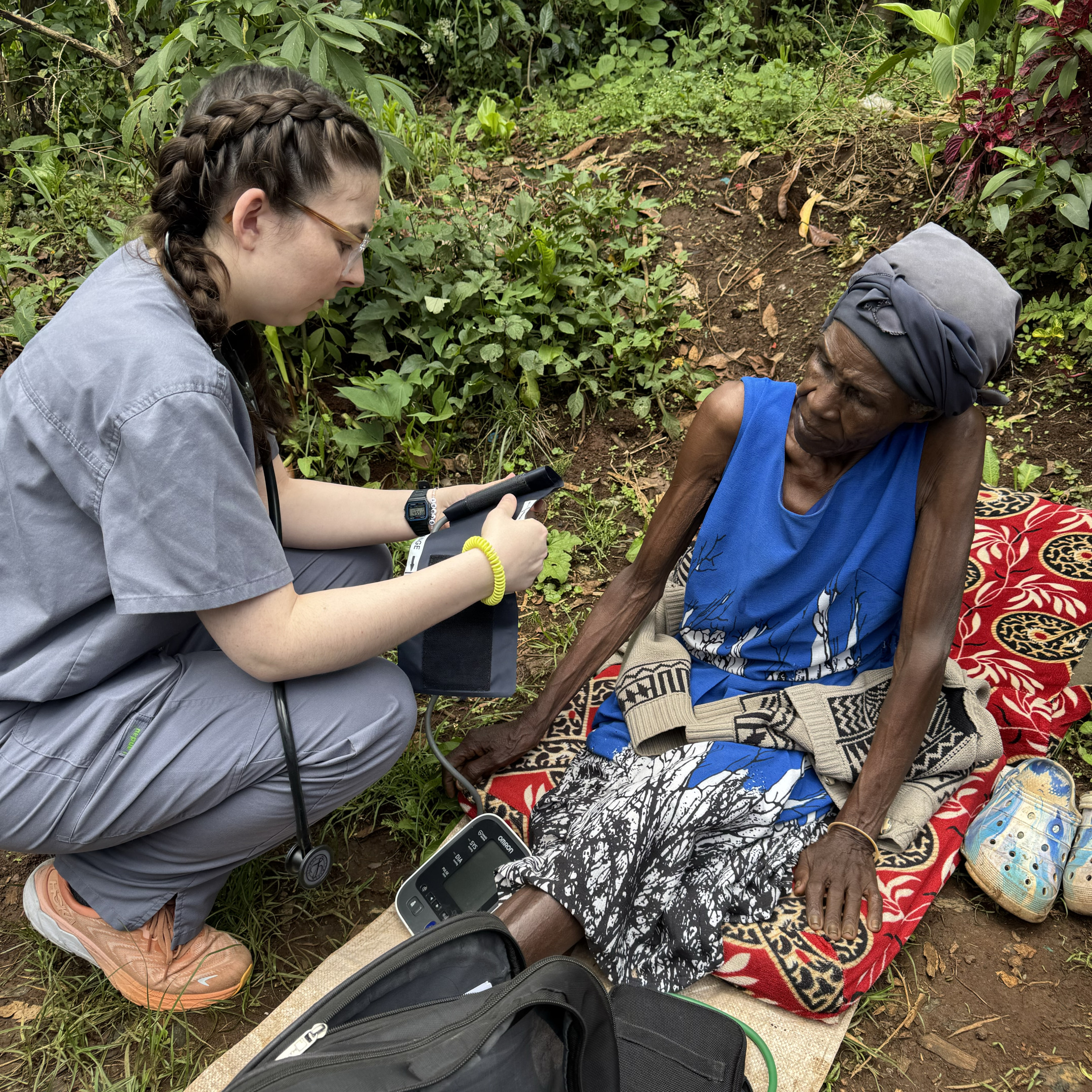
Recent LUCOM graduate Megan Pizzo tends to a resident in Kenya.
“Going to Kenya for a month, really being immersed in the culture there and doing the work for that long, gave me a glimpse into how I could handle (long-term missions) and what I want for my future,” she said. “I came out of that trip being even more passionate about medical missions and wanting to pursue it to be a larger part of my life and career. It opened my eyes to how accessible it is to do medical missions and how there are so many organizations that are seeking out people like me and other medical students to come work for them in the future.”
The trip also opened her eyes to how medical resources can be vastly different in other countries. She recalled the night a 12-year-old girl came into the emergency room with end-stage rheumatic heart disease. The condition can be resolved with a heart transplant, she explained, but such a procedure is not available in Kenya. Pizzo said she was deeply affected by the reality that this young girl wouldn’t live a full life because of where she lived and how advanced the disease was.
“In the United States, we’re very lucky to have tons of technology and resources, we can basically order any tests at any time, but (in Kenya) everything is so limited, and you really have to think through what a patient can afford and if it’s even available,” Pizzo said. “I really got to see a whole different perspective of medicine.”
Lynchburg, Va.
In Maitland’s words: “You don’t have to get on a plane and go across the world to serve people on the margins or under-resourced individuals; they’re right under our noses.” This philosophy is modeled by the multiple ways LUCOM students serve their neighbors in the Lynchburg community each year. Student clubs and interest groups regularly donate time to Park View Community Mission, Blue Ridge Area Food Bank, World Help (a missions organization), the Liberty Ridge Rehab Center, and other local organizations.
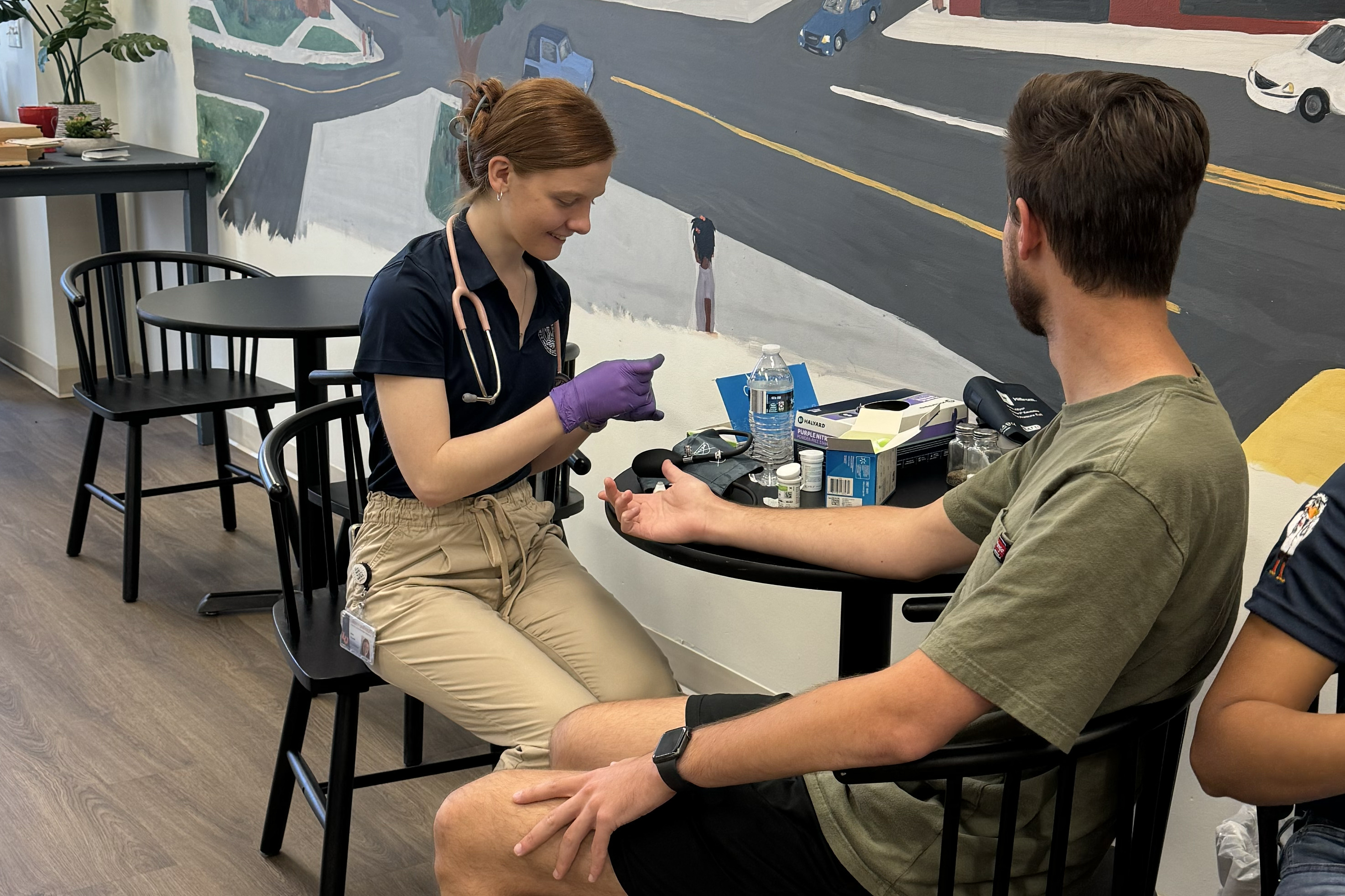
At the Connecting Point food pantry in Lynchburg, students offer tests for blood pressure and blood sugar and give advice on living healthier lifestyles.
Maitland leads students from LUCOM’s Medical Outreach Interest Group in spending two Saturdays each month volunteering at Gospel Community Church’s food pantry ministry, Connecting Point. In addition to helping with the food and laundry services, the students check consenting visitors’ blood pressure and blood sugar and speak to them about living healthier lifestyles within their means. The students who participate are first- and second-year students with little to no clinical experience, making this simple service an opportunity for them to see firsthand how they can impact people through healthcare.
“It rejuvenates their interest in medicine because as they’re sitting in a lecture hall all day learning biochemistry and anatomy and all of that, they’re not really putting that into practice yet, so this is a great way for them to do that,” Maitland said. “I think it’s a way for them to see vulnerable individuals and how they might serve them in the future.”
OMS-III Aaron Boeve spent two years volunteering at Connecting Point and said he has developed relationships with the “regulars” there.
“It is so awesome to have consistent interactions and relationships with people from the community. We get to share God’s love and help in ways that we’ve been practicing as medical students,” he said. “Missions are just as much for your next-door neighbors as for those on the other side of the world. God wants to use us right now exactly where we are. We are trying to utilize the skills that we have now, within the range that we’re able to work medically as current students, to show the love of God to the people around us.”
